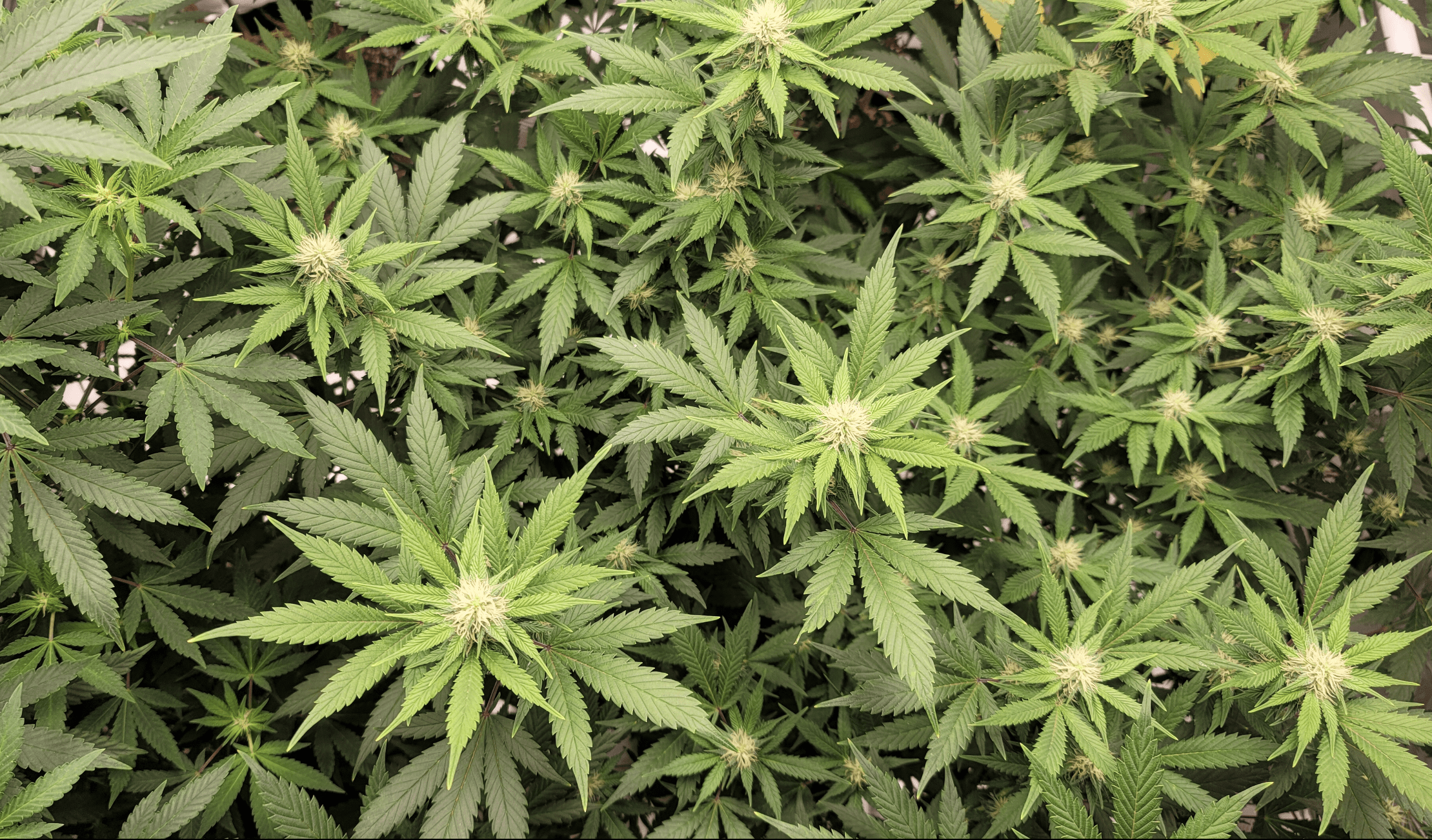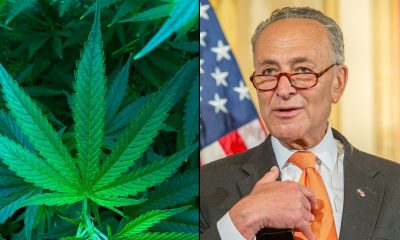Politics
Minnesota Marijuana Legalization Bill Clears Seventh House Committee, Halfway To The Floor

A bill to legalize marijuana in Minnesota advanced through its seventh House committee on Tuesday, just two days after the Senate companion was approved in its fourth panel in the chamber.
The measure from Rep. Zack Stephenson (D) is about halfway through its committee process in the House, and now it’s cleared the Workforce Development Finance and Policy Committee in a voice vote.
“Minnesotans are ready for this change. Our current cannabis laws are doing more harm than good,” Stephenson told panel members at the start of the hearing. “Minnesotans deserve the freedom and respect to make their own decisions about cannabis.”
“This bill creates a comprehensive new marketplace that will foster good jobs and good businesses here in Minnesota at all levels of the cannabis industry,” he said.
The Senate version that’s being carried by Sen. Lindsey Port (D) is also moving along according to plan. It has a total of 18 committee stops before potentially reaching the floor.
With majorities in both the House and Senate and control over the governorship this session, Democratic-Farmer-Labor party officials are confident that legalization will be enacted in short order following the extensive committee consideration.
The governor recently released his biennial budget request, which included proposed funding to implement marijuana legalization and expungements, and made projections about the millions of dollars in cannabis tax revenue that his office estimates the state will earn after the reform is enacted.
Gov. Tim Walz (D) discussed his proposal in a recent interview, explaining why he’s calling for a tax rate on marijuana sales that’s nearly double that of the bill that’s advancing in the legislature.
That legislation is an iteration of the 2021 House-passed bill from former Majority Leader Ryan Winkler (D), who now serves as campaign chairman of the advocacy coalition MN is Ready. That group announced last month that it would be lobbying for the measure while leading a grassroots effort to build support for reform.
The governor has called on supporters to join lawmakers and the administration in their push legalize marijuana this session, and he circulated an email blast last month that encourages people to sign a petition backing the reform.
Much of the revised bills that are advancing through committee are consistent with Winkler’s legislation, though there are a few key changes, in addition to the newly adopted amendments. For example, it adds a new license category for businesses that sell “lower-potency edible products” under Minnesota’s unique THC law that the governor signed last year.
There would also be reduced regulatory requirements for those licensees, and they’d be able to permit on-site consumption if they have a liquor license, which is meant to ensure that shops currently selling low-THC beverages and edibles don’t face disruption.
At Wednesday’s House committee hearing, members adopted an author’s amendment with major revisions, including one component that would require cannabis businesses to be registered with local governments in order to operate.
It would further make it so the state’s top cannabis regulator could not have been a lawmaker or state constitutional officer in the four years prior to taking office, include “public park that includes a playground, athletic field, or other attraction regularly used by minors” in the list of places that local governments can enact rules barring cannabis businesses from being located near and change the hours of the day that local governments are allowed to prohibit cannabis stores from being open.
The sponsor’s amendment goes on to stipulate that medical cannabis caregivers would need to be 21 instead of 18 to obtain and assist patients with flower, require that cannabis products include a warning symbol saying they are not for children along with the poison control system phone number, appropriate funds to the poison control system and clarify that expungements won’t change people’s immigration status.
Further, the revision includes a number of technical changes concerning cannabis extraction, allowable cannabinoid content in edible serving sizes, local control, inspections of marijuana businesses, allowable delivery methods for medical cannabis products and criminal statutes.
The panel also rejected a proposal to prohibit former lawmakers from lobbying for cannabis businesses for a period of one year after leaving office.
Another measure to remove provisions allowing forgiveness of loans to cannabis businesses was also defeated.
Finally, members rejected an amendment to prevent lawmakers who are serving this session from holding a marijuana business license or having a financial interest in a cannabis business until July 1, 2027.
The next stop for the legislation on the House side is the Human Services Policy Committee, which is expected to hold a hearing on the measure next week. The Senate bill is scheduled to go before the Environment, Climate, and Legacy Committee on Thursday.
Here are the main components of the revised marijuana legalization bills, HF 100 and SF 73:
Adults 21 and older could purchase up to two ounces of cannabis and cultivate up to eight plants, four of which could be mature.
They could possess up to two ounces in a public place and up to five pounds in a private dwelling.
Gifting up to two ounces of marijuana without remuneration between adults would be permitted.
It would promote social equity, in part by ensuring that diverse licensing by scoring equity applicants higher.
Prior marijuana records would also be automatically expunged. The Bureau of Criminal Apprehension would be responsible for identifying people who are eligible for relief and process the expungements.
In addition to creating a system of licensed cannabis businesses, municipalities and counties could own and operate government dispensaries.
On-site consumption permits could be approved for events, and cannabis delivery services would be permitted under the bill.
Unlike in many legal states, local municipalities would be banned from prohibiting marijuana businesses from operating in their areas, though they could set “reasonable” regulations on the time of operation and location of those businesses.
Retail cannabis sales would be taxed at eight percent. Part of that revenue would fund substance misuse treatment programs, as well as grants to support farmers.
A new Office of Cannabis Management would be established, and it would be responsible for regulating the market and issuing cannabis business licenses. There would be a designated Division of Social Equity.
People living in low-income neighborhoods and military veterans who lost honorable status due to a cannabis-related offense would be considered social equity applicants eligible for priority licensing.
The legislation as revised fixes an issue in current statute that prohibits liquor stores from selling THC products.
It also contains language banning synthetic cannabinoids, which is consistent with Board of Pharmacy rules put into place last year.
—
Marijuana Moment is tracking hundreds of cannabis, psychedelics and drug policy bills in state legislatures and Congress this year. Patreon supporters pledging at least $25/month get access to our interactive maps, charts and hearing calendar so they don’t miss any developments.
![]()
Learn more about our marijuana bill tracker and become a supporter on Patreon to get access.
—
The other House panels that have passed the legislation in recent weeks are the Agriculture Finance and Policy Committee, State and Local Government Finance and Policy Committee, Labor and Industry Finance and Policy Committee, Environment and Natural Resources Finance and Policy Committee, Judiciary Finance and Civil Law Committee and Commerce Finance and Policy Committee.
The Senate committees that have signed off so far are the Agriculture, Broadband, and Rural Development Committee, Jobs and Economic Development Committee, Commerce and Consumer Protection Committee and Judiciary and Public Safety Committee.
Lawmakers and the governor have expressed optimism about the prospects of legalization this session, especially with Democrats newly in control of both chambers, whereas last session they only had a House majority.
Following their election win in November, Democrats internally agreed to discuss the issue imminently.
House Speaker Melissa Hortman (D) said recently that she expects cannabis reform to be included in the governor’s forthcoming budget request, though she reiterated that the reform “will take a long time” to move through the legislature.
While marijuana reform was excluded from a list of legislative priorities that Democrats unveiled last month, Hortman said that the issue is “a priority,” albeit a “very big, complicated.”
The governor included funding for implementing legalization in his last executive budget request, but lawmakers were unable to enact the policy change. He and Hortman have differing opinions about how quickly the issue can advance this session, however, with Walz recently saying it would be done “by May” and the speaker indicating it could take until next year.
Winkler told Marijuana Moment last month that he agrees with the governor, saying “it is likely that [passing legalization] will be done by May.”
“The reason is that the legislature adjourns until next year at the end of May, and so if they don’t do it in that timeline, it’ll take another full year—and I don’t think anything will be improved or bettered by waiting,” he said. “So it’s in everyone’s interest to get this bill passed.”
Two polls released in September found that the majority of Minnesota residents support adult-use marijuana legalization—and one survey showed that even more Minnesotans approve of the state’s move to legalize THC-infused edibles that was enacted earlier this year.
A survey conducted by officials with the House at the annual State Fair that was released in September also found majority support for legalization. That legislature-run poll found that 61 percent of Minnesotans back legalizing cannabis for adult use.
Support was up this year from 58 percent when the House Public Information Services polled fair goers on the issue in 2021. In 2019, the House poll found 56 percent support for legalization.
New Hampshire Lawmakers Refine Marijuana Legalization Plan, With Vote Expected Soon
Photo courtesy of Mike Latimer.














